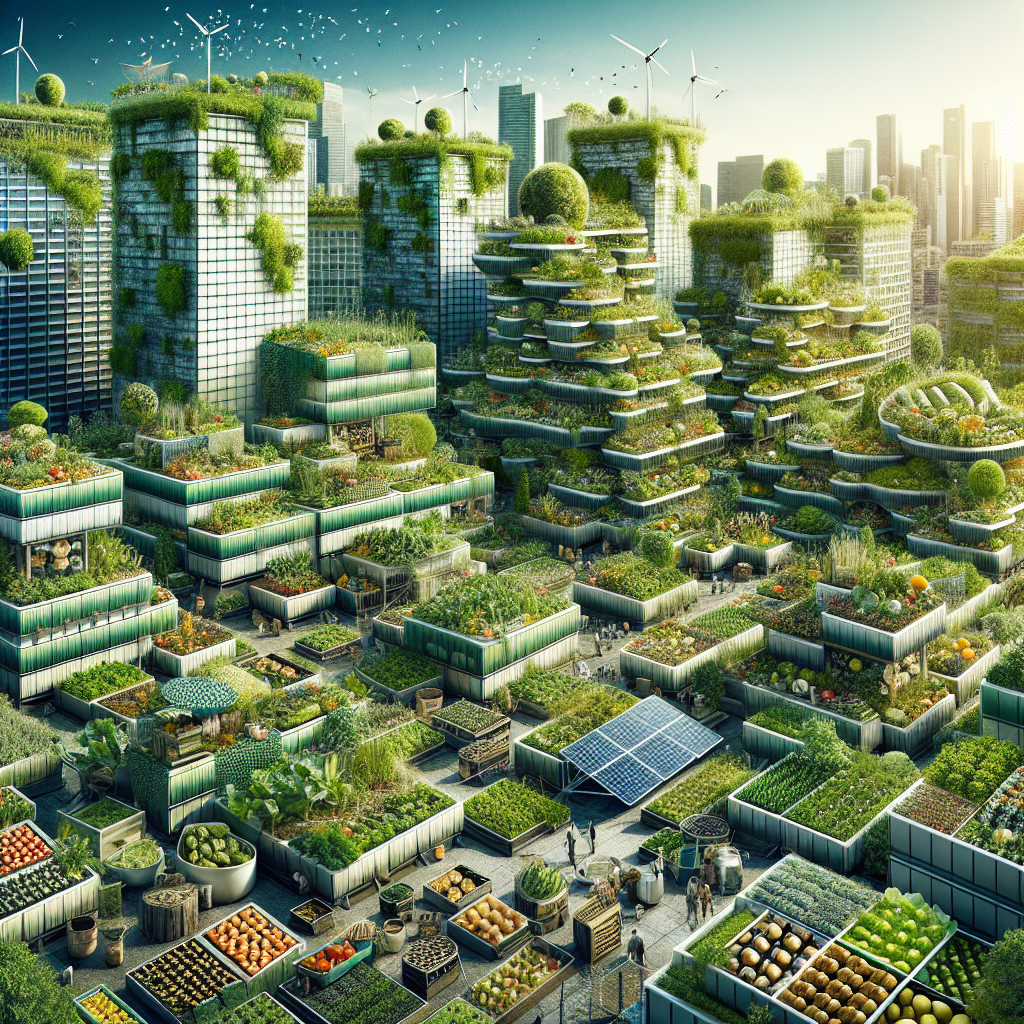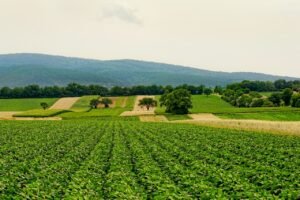
Imagine a bustling cityscape, filled with concrete, steel, and the constant hum of activity. Now, imagine transforming pockets of this urban jungle into vibrant and thriving havens for sustainable agriculture. By incorporating permaculture principles into urban farming, not only can we create beautiful and productive spaces for growing food, but we can also reap a plethora of benefits. From reducing food miles and promoting biodiversity to enhancing community engagement and improving food security, permaculture offers a holistic approach to urban farming that is both environmentally friendly and socially beneficial. Join us as we explore the numerous advantages of incorporating permaculture principles in urban farming and discover how we can transform our cities into sustainable food paradises.

Why incorporate permaculture principles in urban farming?
Permaculture, which stands for “permanent agriculture” or “permanent culture,” is a holistic approach to agriculture that focuses on sustainable and resilient food production. It offers a solution for urban farming by incorporating principles that promote biodiversity, efficient resource use, and reduced environmental impact. By implementing permaculture in urban farming, you can reap a host of benefits that not only support your local community but also contribute to a healthier planet.
Sustainable and resilient food production
One of the main advantages of incorporating permaculture principles in urban farming is the ability to achieve sustainable and resilient food production. Permaculture encourages the use of various techniques and strategies that mimic natural ecosystems, resulting in a more sustainable and long-lasting food system. By designing your urban farm according to permaculture principles, you can create an ecosystem that is capable of providing a continuous supply of fresh and nutritious food for your community.
Promotes biodiversity and ecosystem health
Permaculture also emphasizes the importance of biodiversity and ecosystem health in food production. By integrating diverse plant and animal species in your urban farm, you can create a balanced and self-sustaining ecosystem. This not only improves soil fertility, but also reduces pest problems and the need for harmful chemical inputs. Additionally, promoting biodiversity in urban areas can help support native wildlife populations and contribute to the overall health of urban ecosystems.
Efficient use of resources
Another advantage of permaculture in urban farming is its focus on efficient resource use. The design principles of permaculture aim to maximize productivity and minimize waste. By practicing techniques such as companion planting, water conservation, and efficient energy use, you can optimize the use of limited resources in an urban setting. This not only reduces costs but also helps mitigate the negative environmental impacts associated with intensive agriculture.
Reduces environmental impact
Lastly, incorporating permaculture principles in urban farming can significantly reduce the environmental impact of food production. Traditional agriculture often relies on synthetic fertilizers, pesticides, and large amounts of water, all of which have detrimental effects on the environment. Permaculture, on the other hand, focuses on regenerative practices that prioritize the health of soil, water, and ecosystems. By adopting these principles, urban farmers can minimize their carbon footprint, conserve water resources, and contribute to the overall health of the planet.
Advantages of permaculture in urban farming
Increases food security
One of the key advantages of permaculture in urban farming is its ability to increase food security. As urban areas continue to grow, access to fresh and nutritious food becomes a concern. By implementing permaculture principles in urban farming, communities can develop a local and reliable food supply, reducing their dependence on external sources. This ensures that even in times of crisis or disruptions in the global food system, urban communities can continue to have access to healthy food.
Improves soil health
Traditional agricultural practices often deplete the soil of its nutrients and organic matter, leading to degraded soils that are less productive over time. Permaculture, however, promotes practices that improve soil health and fertility. Techniques such as composting, mulching, and crop rotation are utilized to increase organic matter content, enhance soil structure, and promote beneficial soil microorganisms. By adopting these practices, urban farmers can create and maintain healthy soils that are capable of supporting long-term food production.
Reduces water usage
Water scarcity is a growing concern in many urban areas, making efficient water use a critical factor in urban farming. Permaculture techniques, such as rainwater harvesting, graywater recycling, and drip irrigation, help minimize water usage while ensuring optimal plant growth and health. By incorporating these practices, urban farmers can contribute to water conservation efforts and reduce the strain on municipal water supplies.
Mitigates climate change
Agriculture is a significant contributor to greenhouse gas emissions, primarily through the use of synthetic fertilizers, mechanized farming equipment, and transportation of food. Permaculture in urban farming offers a more sustainable alternative that can help mitigate climate change. By reducing reliance on chemical inputs, implementing carbon sequestration practices, and promoting local food production, permaculture can help reduce the carbon footprint associated with food production and transportation.

Enhancing urban spaces with permaculture
Transforming vacant lots into productive spaces
One of the key ways permaculture can enhance urban spaces is by transforming vacant lots into productive and thriving urban farms. Many cities have abandoned or underutilized areas that can be repurposed for agricultural purposes. Permaculture principles can be applied to convert these lots into vibrant food-producing spaces that not only provide fresh produce for the community but also contribute to greening and beautification efforts within the city.
Utilizing rooftops and vertical spaces
In densely populated urban areas where land is limited, permaculture offers innovative solutions by utilizing rooftops and vertical spaces for farming. Rooftop gardens can be created by designing and installing suitable growing systems, such as container gardens or hydroponics setups, on the tops of buildings. Similarly, vertical farming techniques, such as trellises or living walls, can be employed to maximize growing space on walls or in tight spaces. These approaches not only make the most of available space but also add greenery and visual appeal to urban environments.
Creating community gardens
Permaculture also promotes the creation of community gardens, which serve as shared spaces for cultivating food and fostering community relationships. Community gardens provide individuals and families with the opportunity to grow their own food, regardless of the size of their living space. They also act as hubs for knowledge exchange, where experienced gardeners can mentor beginners and share valuable skills and insights. Community gardens play a vital role in enhancing social connections, promoting food security, and beautifying urban neighborhoods.
Promoting sustainable urban lifestyles
Encourages local food production
One of the fundamental principles of permaculture is the emphasis on local food production. By incorporating permaculture practices into urban farming, communities can reduce their reliance on external food sources and strengthen their local food systems. This not only supports local farmers and businesses but also reduces the environmental impact associated with long-distance transportation of food. Promoting local food production through permaculture creates more resilient urban communities that are better prepared for disruptions in the global food supply chain.
Promotes self-sufficiency
Permaculture empowers individuals to take control of their food production and embrace self-sufficiency. By growing their own food, urban dwellers can reduce their dependence on commercial agriculture, improve the quality and nutritional value of their diet, and save money on grocery bills. Self-sufficiency in food production also gives individuals a sense of empowerment and increased resilience in the face of uncertainty or challenges in the food system.
Builds stronger communities
Permaculture in urban farming has the potential to build stronger and more connected communities. When people come together to grow food, share resources, and exchange knowledge, they create bonds and foster a sense of belonging. Community involvement in urban farming projects promotes cooperation, collaboration, and social interaction, leading to more inclusive and resilient neighborhoods.
Improves mental and physical well-being
Engaging in urban farming activities based on permaculture principles can have significant positive impacts on mental and physical well-being. Spending time outdoors, connecting with nature, and engaging in physical activity while tending to plants can reduce stress, increase physical fitness, and improve overall mental health. Urban farming also provides opportunities for learning and personal growth, which contribute to a sense of purpose and fulfillment in one’s daily life.

Challenges and solutions of implementing permaculture in urban farming
Limited space and access to land
One of the main challenges in implementing permaculture in urban farming is the limited availability of space and access to land. Urban areas often have a scarcity of suitable land for agricultural purposes, making it difficult for individuals or communities to start their own urban farms. However, creative solutions such as rooftop gardens, vertical farming, and utilizing underutilized spaces can help overcome this challenge. Collaborations with local governments, non-profit organizations, and community initiatives can also play a crucial role in securing land for urban farming projects.
Limited knowledge and support
Another challenge is the limited knowledge and support for permaculture in urban farming. Many urban residents may not be familiar with permaculture principles or may lack the necessary skills and resources to implement them. Educational programs, workshops, and training opportunities can address this challenge by providing accessible and practical knowledge on permaculture practices. Sharing success stories and practical examples can also inspire and motivate individuals to embrace permaculture in their urban farming endeavors.
Perceived aesthetic and regulatory barriers
Permaculture-based urban farming may face aesthetic and regulatory barriers in some communities. The unconventional design elements, use of natural materials, and wild appearance of permaculture gardens may not align with traditional notions of landscaping or neighborhood aesthetics. In such cases, community engagement and education are essential to raise awareness about the benefits of permaculture and address concerns. Working closely with local authorities and demonstrating the positive impact of permaculture projects can help overcome regulatory barriers and encourage their acceptance.
Education and awareness
The lack of education and awareness about permaculture is a significant deterrent to its implementation in urban farming. Many people may be unaware of the principles and benefits of permaculture or may have misconceptions about its feasibility in an urban context. Enhancing education and awareness through targeted campaigns, community outreach, and partnerships with educational institutions can help dispel myths and provide accurate information about the potential of permaculture in urban farming.
Successful examples of permaculture in urban farming
The Urban Farming Institute in Boston
The Urban Farming Institute (UFI) in Boston is a non-profit organization that promotes urban farming and permaculture principles. UFI operates several urban farms where they showcase sustainable farming techniques to the local community. Through educational programs, workshops, and youth initiatives, UFI has successfully empowered individuals and communities to embrace permaculture and urban farming.
The Brooklyn Grange in New York City
The Brooklyn Grange is a pioneering commercial urban farm located on rooftops in New York City. By utilizing unused rooftop space, the Brooklyn Grange produces thousands of pounds of organic produce annually. With a focus on sustainability and community engagement, the farm has become a model for successful permaculture-based urban farming, inspiring other cities to follow suit.
The Permablitz movement in Australia
The Permablitz movement in Australia is a community-driven initiative that aims to transform urban spaces into productive permaculture gardens. Based on the concept of “blitzing,” volunteers come together for a day to install permaculture systems in private or public spaces. The Permablitz movement has created a network of resilient and abundant urban gardens, strengthening local food systems and building stronger communities.

The role of technology in permaculture and urban farming
Aquaponics and hydroponics
Aquaponics and hydroponics are innovative farming techniques that can be integrated with permaculture principles in urban farming. These systems use less water and space compared to traditional soil-based farming while providing optimal growing conditions for plants. By combining permaculture techniques with aquaponics or hydroponics, urban farmers can maximize their food production in a sustainable and efficient manner.
Vertical farming
Vertical farming is another technological advancement that complements permaculture in urban farming. By utilizing vertical space and indoor farming methods, such as hydroponics or aeroponics, vertical farms can produce high volumes of crops in a controlled environment. This approach minimizes the need for land and reduces the reliance on external resources, making it a suitable solution for urban areas with limited space.
Smart irrigation systems
Smart irrigation systems, equipped with sensors and data-driven technology, can significantly improve water management in urban farming. These systems monitor soil moisture levels, weather conditions, and plant water requirements to optimize water usage. By delivering water precisely when and where it is needed, smart irrigation systems reduce water waste and contribute to more sustainable and efficient urban farming practices.
Policy and government support for permaculture in urban farming
Incentives and grants
Government incentives and grants play a crucial role in supporting permaculture in urban farming. Financial assistance, such as tax credits or subsidies, can help offset the initial costs associated with implementing permaculture practices. Grants and funding programs specifically targeted at urban farming and sustainable agriculture can provide the necessary resources for individuals and communities to start and expand their permaculture projects.
Zoning regulations and land use policies
Zoning regulations and land use policies have a significant impact on the feasibility and success of permaculture in urban farming. Government bodies can play a vital role in facilitating the conversion of vacant lots or underutilized spaces into urban farms by amending zoning regulations and permitting urban agriculture. Clear guidelines and streamlined processes for obtaining permits can remove barriers and provide clarity to individuals and organizations interested in permaculture-based urban farming.
Educational programs and training
Government support can also be channeled towards educational programs and training initiatives that promote permaculture in urban farming. By partnering with educational institutions and community organizations, governments can provide workshops, courses, and practical training opportunities on permaculture practices. These programs can equip individuals with the necessary knowledge and skills to implement permaculture principles in their urban farming endeavors.

Empowering individuals through permaculture
Accessible and affordable food production
One of the key ways permaculture empowers individuals is by providing access to accessible and affordable food production. By growing their own food, individuals can reduce their grocery bills, especially in areas where fresh and nutritious produce is expensive or hard to come by. Permaculture techniques, such as container gardening or community gardens, make it possible for individuals with limited space or resources to participate in urban farming and enjoy the benefits of homegrown food.
Skills development and self-reliance
Embracing permaculture in urban farming also offers individuals the opportunity for skills development and self-reliance. Learning about sustainable farming practices, soil management, composting, and seed saving not only enhances one’s knowledge but also equips them with valuable skills that can be applied in other areas of life. These skills foster a sense of self-reliance and resilience, empowering individuals to take charge of their own food production and contribute to a more sustainable future.
Individual and community empowerment
Permaculture in urban farming promotes individual and community empowerment. By engaging in sustainable farming practices and participating in community-based initiatives, individuals gain a sense of ownership and agency over their immediate surroundings. This empowerment can extend to broader civic engagement and contribute to positive social change. As communities become more involved in urban farming and permaculture projects, they can collectively address social, economic, and environmental challenges and create a more resilient and sustainable future.
Conclusion
Incorporating permaculture principles in urban farming offers a wealth of benefits that go beyond individual gardens or farms. By adopting sustainable and regenerative practices, urban farmers can support food security, improve soil health, reduce water usage, and mitigate climate change. Permaculture also enhances urban spaces by transforming vacant lots, utilizing rooftops and vertical spaces, and creating community gardens. It promotes sustainable urban lifestyles by encouraging local food production, promoting self-sufficiency, building stronger communities, and improving mental and physical well-being. Although challenges exist, successful examples and government support demonstrate the potential of permaculture in urban farming. By empowering individuals and communities through accessible and affordable food production, skills development, and self-reliance, permaculture creates a pathway towards a more sustainable and resilient future.







